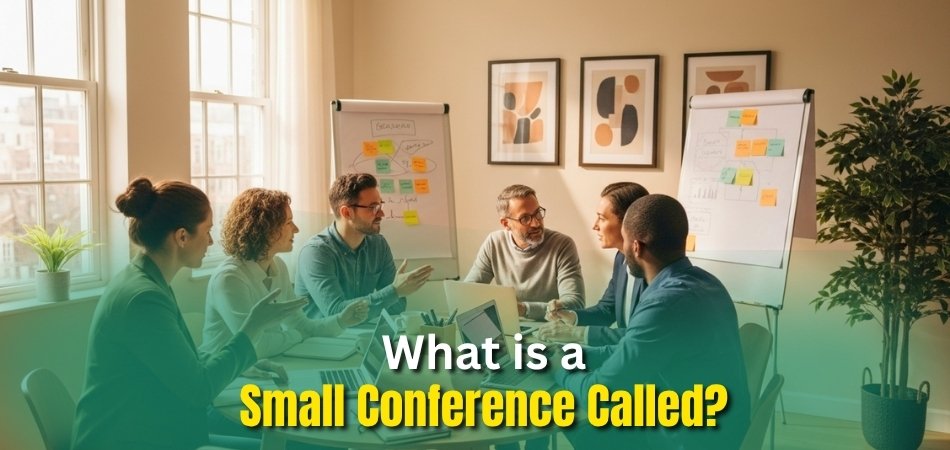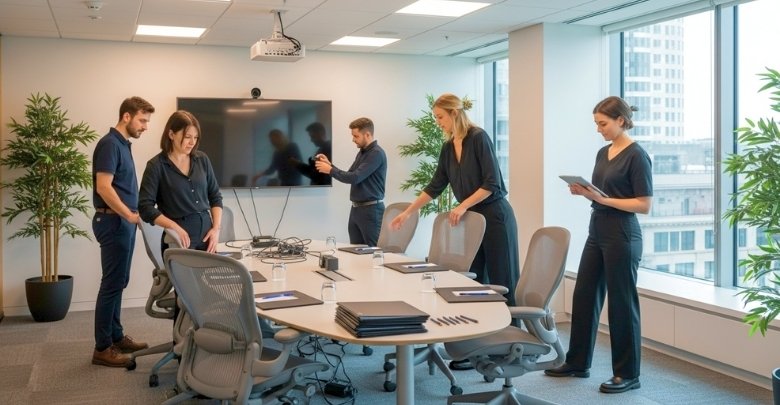A small conference is a short and simple event where people come together in a small group. It feels more personal than big events and is easier to join. These types of gatherings are held for learning, sharing, or solving something in a focused way. However, many people have a question in their mind: What is a small conference called?
Such events are commonly known as seminars, workshops, symposiums, roundtables, or meetups. Each term reflects a slightly different purpose or structure, but all focus on gathering a limited number of participants to discuss one central topic. They’re calm, interactive, and effective for sharing knowledge and building connections in a more engaging environment.
Are you curious to know more about these types of small events? Or want to understand which type fits which need, or when to use what name? Then continue reading this article to learn all the basic and practical information about small conferences and the terms used to characterize them.
What is a Small Conference Called?
There are many ways to describe a small conference—it can be called a seminar, workshop, or symposium. In these events, a few people share ideas or learn something new. They are more focused and personal than large conferences. Keep reading to find out the common names and types of small conferences below.

Seminar
People learn about a single topic in a small, targeted gathering called a seminar. It often includes a speaker who explains ideas or shares research. Attendees can ask questions and discuss thoughts together. Seminars are common in schools, businesses, and community centers. They help people understand one subject in detail.
Workshop
A workshop is a hands-on learning event. People work in groups to learn a skill or complete a task. It is more practical than a seminar and encourages everyone to take part. Workshops are often used for training or improving work skills. They are great for people who learn best by doing things.
Symposium
Symposiums are small, formal meetings that discuss a specific topic. Experts give short talks and then discuss their ideas. It usually focuses on research or serious issues. Unlike a big conference, it feels more focused and calm. Symposiums help people exchange knowledge and improve understanding.
Roundtable
A roundtable is an open talk among a few people. Everyone has an equal chance to speak and share views. It is good for solving problems or planning projects. These talks help teams or groups find better ideas together. A roundtable feels friendly and supports teamwork.
Meetup
The term “meetup” refers to an informal gathering of people with similar interests. It can be small, casual, and relaxed. People meet to chat, share, and make new friends. Meetups can be about anything, from tech to hobbies. Many are organized online through social media or event sites.
Who Usually Organizes Small Conferences?
Small conferences are often planned by groups who want to share ideas. They bring together people with similar goals or interests. The organizers make sure everything runs smoothly and everyone learns something new. Let’s look at the main people and groups who usually organize small conferences below.
Educational Institutions
Schools, colleges, and universities often arrange small conferences for learning. Teachers and professors plan these events to help students and experts share knowledge. These meetings can include lectures, talks, and group discussions. Educational conferences often focus on one subject or new research. They help people learn and stay updated on new ideas.
Community Organizations
Local groups or clubs plan small conferences on public topics. These can cover health, environment, or social issues. Organizers work with speakers or volunteers to teach people. Community events help spread awareness and encourage teamwork. For example, many upcoming conferences in Canada, the UK, and the USA are arranged by local groups to support learning and community growth.
Professional Associations
Professional associations organize small conferences for their members. These events focus on sharing updates and skills in a certain field. Members get to meet others, learn, and talk about new trends. Such conferences build teamwork and trust among professionals. Many industries hold yearly or seasonal events for this reason.
Companies And Businesses
Companies arrange small conferences for staff training or product discussions. Business leaders use these meetings to teach, plan, or share updates. They can also invite experts to speak about the market or trends. These sessions help workers learn and improve their skills. Small business meetings often lead to new ideas and better teamwork.
Research Groups
Research teams and labs organize small meetings to share findings. They invite scientists, students, or other researchers to discuss results. These small talks help in solving problems and learning from others. They are also a good place to present studies before big events. Many research groups do this to improve their work.
Event Management Teams
Event planners or management teams also handle small conferences. They help arrange the place, schedule, and other event needs. These experts make sure the event runs well and on time. They can work with schools, companies, or groups. Many organizers use event planners to save time and reduce stress.
How Does an Organizer Arrange a Small Conference?
Arranging a small conference takes good planning and teamwork. The organizer needs to handle every detail with care. From picking the topic to setting the date, each step matters. Let’s look at how organizers plan and manage small conferences in simple, easy steps below.
Choose the Main Theme
Every good conference starts with a clear theme or topic. It helps guide the speakers and keeps the event focused. To keep the event focused, organizers start by writing clear conference objectives that match the theme and plan. The theme should match the audience’s interests and goals. Once the theme is set, everything else falls into place more easily.
Set the Budget
Before anything begins, planning the budget is very important. It covers the cost of space, food, speakers, and materials. The organizer lists all needed items and their costs. They also plan for small extra expenses. A clear budget keeps the event smooth and avoids last-minute money issues.
Pick the Venue
Finding the right place is one of the key steps. The venue should be easy to reach and accommodate the number of guests. Organizers check for parking, seating, and needed equipment. They often visit a few places before deciding. The right venue helps guests feel welcome and comfortable during the event.
Invite Speakers and Guests
Speakers bring value and make the event interesting. Organizers look for experts who can explain topics clearly. They send invites early and share event details. Good communication helps speakers prepare well. Inviting a mix of speakers and guests also makes the event lively and informative.
Plan the Schedule
A clear schedule keeps the event organized and on time. The organizer sets times for each session, break, and talk. They make sure no two events overlap. Planning helps guests know what’s next. A good schedule keeps people focused and makes the day run smoothly.
Manage Promotion and Registration
Once the plan is ready, it’s time to spread the word. Organizers share event details on websites, social media, and emails. They make registration easy and clear. Keeping a list of attendees helps manage numbers. Promotion and simple sign-up steps ensure more people join and enjoy the event.
When Should an Attendee Choose a Small Conference Over a Large One?
Choosing between a small and a large conference depends on personal goals. Some people want deep talks and small group learning. Others like bigger crowds and more choices. Let’s look at when picking a small conference makes more sense and why it can be a better fit.
Personal Interaction Benefits
Small conferences make it easy to talk with speakers and guests. You can ask questions, share ideas, and get real answers. The relaxed setup helps you connect with others faster. In big events, this is often hard. If you like close discussions, small gatherings are the right choice.
Focused Topic Learning
If you enjoy learning deeply about one subject, small conferences fit well. They cover fewer topics but in more detail. Sessions are built for people with the same interests. This helps you stay focused without getting lost. It’s easier to follow along and understand every part of the discussion.
Building Real Connections
Smaller events give time to talk and make strong connections. You can meet people who share your work or goals. These talks often turn into teamwork or projects later. At large events, it’s easy to get lost in the crowd. Small settings let real relationships grow naturally.
Calm and Organized Environment
Big conferences can be noisy and packed with people. Small ones feel calm, simple, and easy to manage. You can move between sessions without stress. You also get more time to rest and think. If you enjoy peace while learning, smaller events will make you comfortable.
Budget-friendly Choice
Attending small conferences usually costs less. Tickets, travel, and stays are often cheaper. You get good value without spending much. Many small events even offer meals or simple plans. If you want to learn without high costs, these are the smart choice.
Better Learning Experience
Small meetings help people focus and take part more. You can ask questions, share ideas, or even join short activities. It’s easier to learn when the group is small and friendly. Many people remember more from these events than from large ones. The learning feels direct and personal.
Steps Attendees Take to Join a Small Conference
Joining a small conference is easy when you follow a few steps. It helps you stay ready and make the most of the event. Each step matters, from finding the right event to showing up on time. Let’s see how attendees prepare and take part in small conferences below.
Search for Upcoming Events
People start by looking for small conferences that match their interests. They can search online, check social media, or ask their friends. Many websites list new and local events every month. Checking early gives more time to plan. Finding the right event is the first step to joining successfully.
Read the Event Details
Once you find an event, read the full details carefully. Look for the topic, date, and location. Make sure it fits your schedule and interests. Most conferences share this info on their official website or post. Reading the details helps you decide if the event is worth attending.
Register for the Event
After choosing the right event, it’s time to register. Registration can be done online through simple forms. Fill out your name, contact, and other basic details. Some events require a small fee for joining. Early registration also helps you get updates or special discounts later.
Arrange Travel and Stay
If the event is in another city, plan your trip early. Book your tickets and hotel once your registration is confirmed. It’s always better to stay close to the venue. This saves time and makes travel easier. Planning your travel early keeps you stress-free before the event.
Apply for a Visa If Needed
Some small conferences take place in other countries. In that case, attendees must check if they need a visa. Start the visa process early to avoid stress or delay. Keep your invitation letter and registration proof ready. Applying early helps you travel smoothly and attend the event on time.
Prepare for the Sessions
Before attending, check the list of speakers and sessions. You can look at conference agenda examples to understand how events are usually planned. Make a note of which talks you want to join. It helps you stay ready and focused during the event. Being prepared makes learning and networking much easier.
Carry the Right Materials
Bring the needed items like notebooks, pens, or digital devices. Many attendees also carry business cards or flyers. It helps them share contact info quickly. Keeping your items ready saves time and avoids last-minute panic. Simple preparation makes you look confident and organized.
Take Part in Discussions
Small conferences are a great place to speak and share ideas. Try asking questions or joining group talks. It helps others know you and remember your views. Sharing thoughts makes the event more fun and useful. Active participation always gives better learning and connections.
Stay Connected After the Event
After the event, stay in touch with the people you met. You can connect through email or social media. This helps build lasting relationships. Many great projects start with simple post-event chats. Staying connected keeps the learning and teamwork going strong.
Frequently Asked Questions
Small conferences are special types of gatherings where a limited number of people come together to share ideas, learn new things, or discuss a focused topic. These events are often more relaxed, personal, and easier to manage than large conferences. Below are some frequently asked questions to help you understand small conferences better.
What Makes a Small Conference Different From a Large One?
A small conference focuses on personal interaction and detailed learning. Fewer people attend, so everyone gets more time to talk and ask questions. Large conferences usually have many sessions happening at once, while small ones are more focused on one main topic or goal.
Why Are Small Conferences Becoming Popular?
Small conferences are growing popular because people prefer personal learning over crowded events. They make it easier to connect, share ideas, and get real help from experts. They also cost less to attend and organize, which makes them a practical choice for many.
How Long Does a Small Conference Usually Last?
Most small conferences last one to two days. The short duration keeps attendees focused and interested. Organizers often plan sessions, breaks, and networking activities within that time. Some even end in one day if the event has a clear and specific goal.
What Are the Benefits of Attending a Small Conference?
Small conferences offer better communication, detailed learning, and new connections. Attendees can interact directly with speakers and ask questions freely. These events are less stressful, more affordable, and give participants more time to focus on what really matters.
Can Small Conferences Be Held Online?
Yes, small conferences can easily be held online through video platforms. Virtual versions are cheaper, easier to manage, and open to people from anywhere in the world. Online small conferences still offer group discussions, live sessions, and interaction through chat or video.
What Types of Topics Are Covered in Small Conferences?
Small conferences cover a wide range of topics, depending on the group. Some focus on education, technology, research, or health. Others may talk about business trends, art, or social issues. The main goal is always to explore one subject deeply and clearly.
Who Usually Attends Small Conferences?
Small conferences attract people who share similar interests. This includes professionals, students, teachers, researchers, or community members. Since the group is smaller, attendees often get a chance to talk to everyone and form meaningful connections during the event.
Conclusion
If you’ve ever wondered what is a small conference called, now you know it could be a seminar, workshop, symposium, or even a casual meetup. These events may be small in size, but they bring big value when it comes to learning, sharing, and making real connections.
They offer calm spaces to dive deep into a topic, speak directly with experts, and take part in hands-on experiences. Whether you’re learning a new skill or building your network, small conferences create the perfect space for both.
So next time you’re picking an event, think about what you really want. If it’s focus, comfort, and quality conversation, small is the way to go!







